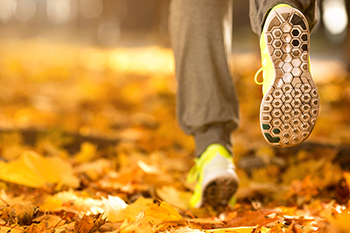
Most runners have some form of foot pain at some point. Complaints range from blisters to plantar fasciitis, and even stress fractures. Taking care of the feet is sometimes overlooked by runners who concentrate more on other body parts. For trail runners who traverse uneven, wet, or slippery terrain, attention to foot health can be paramount. First and foremost for any runner is proper footwear. Be sure to find shoes that are made specifically for natural terrain and fit well. Socks can be just as important as shoes. Look for socks that wick moisture and prevent blisters. Try to keep your feet dry, if at all possible. Some runners tend the calluses on the sole of the feet with a pumice, but it’s a good idea to see a podiatrist if they cause pain or gait problems. Orthotics may be a solution to avoiding them. Other ways that trail runners can care for their feet are to keep toenails carefully trimmed, give your feet a massage, and pamper them after a run. If you experience foot pain or problems caused by running, please visit a podiatrist for more information.
All runners should take extra precaution when trying to avoid injury. If you have any concerns about your feet, contact Leonard Talarico, DPM of Georgia. Our doctor will treat your foot and ankle needs.
How to Prevent Running Injuries
There are a lot of mistakes a runner can make prior to a workout that can induce injury. A lot of athletes tend to overstretch before running, instead of saving those workouts for a post-run routine. Deep lunges and hand-to-toe hamstring pulls should be performed after a workout instead of during a warmup. Another common mistake is jumping into an intense routine before your body is physically prepared for it. You should try to ease your way into long-distance running instead of forcing yourself to rush into it.
More Tips for Preventing Injury
- Incorporate Strength Training into Workouts - This will help improve the body’s overall athleticism
- Improve and Maintain Your Flexibility – Stretching everyday will help improve overall performance
- “Warm Up” Before Running and “Cool Down” Afterward – A warm up of 5-10 minutes helps get rid of lactic acid in the muscles and prevents delayed muscle soreness
- Cross-Training is Crucial
- Wear Proper Running Shoes
- Have a Formal Gait Analysis – Poor biomechanics can easily cause injury
If you have any questions, please feel free to contact our office located in Pooler, GA . We offer the newest diagnostic and treatment technologies for all your foot care needs.